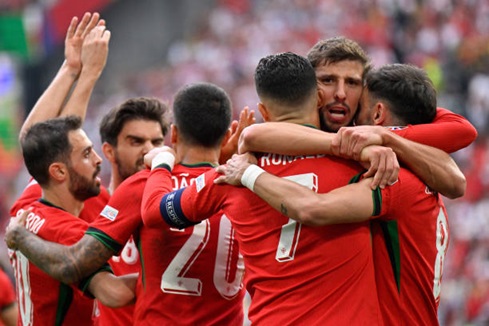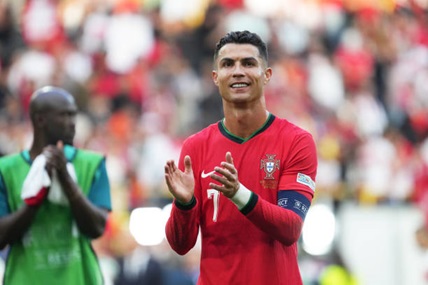 Prior to the start of the European Championships, Roberto Martínez said he wanted his Portugal side to “grow across the 7 matches” of the tournament. Based on the Seleção’s opening two showings in Germany, the manager’s plan is reasonably on track.
Prior to the start of the European Championships, Roberto Martínez said he wanted his Portugal side to “grow across the 7 matches” of the tournament. Based on the Seleção’s opening two showings in Germany, the manager’s plan is reasonably on track.
Two victories without sparkling performances is in line with the much-repeated cliché about not peaking too early. Türkiye provided a different challenge to that posed by Czechia, as did their booming support in the stands in Dortmund, so we take a look at some of the takeaway aspects of Portugal’s latest win.
Martínez changes as Portugal’s class and nerve tells
Having deployed 3 centre-backs against Czechia, Martínez alternated his system for the clash against Türkiye, with the sides matching each other up in a 4-2-3-1 set-up. João Cancelo’s switch from left wing-back to right-back was the significant positional adjustment, while João Palhinha came into midfield in order to contain a more varied threat.
The changes were no surprise, but they add to the extent to which Martínez will keep opposition managers guessing. It makes Portugal a versatile and adaptable side, reflective of their coach. Amid a crackling atmosphere in Dortmund, where Portuguese attendees were in the minority, Martinez’s men dealt well with their exuberant but inexperienced opponents.
Whistles from the crowd greeted the Seleção’s calm and measured build-up, which was unphased by a high early Turkish press. Montella had removed stylish teenage wide players Arda Güler and Kenan Yildiz, replaced by more robust options, as Türkiye focused their attacks largely into wide areas, where their direct and forceful approach occasionally caused problems. Yet it always felt that Portugal’s composure and greater class against a mirrored system would tell.
Türkiye’s reputation as an emotional side was enhanced by their reaction to Bernardo’s opener. Within minutes Abdülkerim Bardakci had been booked for a heavy challenge, then nervy goalkeeper Altay Bayindir and defender Samet Akaydin contrived to produce the most embarrassing of own goals. Portugal, meanwhile, displayed the composure and calm of a rounded and confident group, allowing their quality to make the difference.
Right side shows class, but also vulnerability
In contrast to the previous match, Portugal’s right side was a major threat in the first half in particular. Bernardo Silva was outstanding, not only for his vintage clinical finish to make the breakthrough, but also for his intelligence, movement and energy levels. For 90 minutes, Bernardo was constantly in motion, drawing players, covering for teammates and orchestrating.
João Cancelo produced no shortage of quality in the attacking third, providing the type of magical threat he is in the team to contribute. Indeed, he and Bernardo combined particularly well in the second half to almost conjure a first goal for Ronaldo, who was unable to execute his header from a good position.
Whilst there was a Manchester City-esque complete nature to Bernardo’s performance, Cancelo had a mixed afternoon and experienced serious problems defensively; beaten in 1v1 situations on several occasions. At one point in the first half, Türkiye left winger Kerem Aktürkoglu sped past Cancelo twice in the space of a minute.
The extent to which the Barcelona man could be a liability against top class wingers will remain a question asked by many. With so much threat in modern football coming from wide forward players, some of the game’s top coaches have increasingly emphasised strong 1v1 defenders in full-back positions. For Man City coach Pep Guardiola, who dispensed with Cancelo last year, centre-backs have become favoured to deal with the game’s top inverted wide forwards.
Nélson Semedo was the replacement of choice midway through the second period. Meanwhile, Diogo Dalot lacks Cancelo’s class on the ball, but has enjoyed some solid performances in battles against elite wide players in recent months. A talking point for the latter stages.
 Utilising Ronaldo’s intelligence
Utilising Ronaldo’s intelligence
Cristiano Ronaldo is yet to score in this tournament, but his content demeanour after the first two games is evidence that the captain knows he is playing his part. Against Czechia, Ronaldo’s intelligent movement was perhaps not exploited well enough by his teammates, but the win over Türkiye saw slightly more promise.
Ronaldo gifted Bruno Fernandes a goal with a selfless assist, which was a nice touch given Fernandes had a quiet game otherwise. Similar to his no10 counterpart, Benfica’s Orkun Kökçü, who was replaced at half time. Fernandes tried to get close to Ronaldo, looking to exploit space created by his movement; it worked well for his goal, but otherwise Fernandes had a subdued afternoon.
Türkiye again played without a natural no9, leaving converted wide man Baris Yilaz struggling to affect the imperious Pepe and Rúben Dias. Portugal’s centre-back pairing had an easy day, being allowed to largely focus on snuffing out threats in other areas and covering space inside the full-backs. Ronaldo, unlike Yilaz, offered constant headaches with his positioning off the ball.
The opening goal for Bernardo owed plenty to Ronaldo, who did not even touch the ball, let alone gain credit for an assist. After the Czechia game we discussed the importance of second runs in the box to exploit Ronaldo’s qualities, and when his confusing deep initial run split the Turkish CB pairing and distracted covering left-back Ferdi Kadioglu, Bernardo was on-hand to seize on the chaos caused.
Portugal beat Turkey 3-0 at Euro 2024 to take top spot in Group F
Portugal 3-0 Türkiye match reaction: “Portugal are in the mix to win Euro 2024” - Kökçü
Portugal vs Türkiye - Player Ratings
Will Leão return to the XI for the knockouts?
Rafael Leão’s second yellow card of the tournament – both for diving – is a major setback and led to his withdrawal at half time. The booking would have frustrated Martínez, but it will not be the only issue. Türkiye appeared to target Portugal’s left side in the early stages with purposeful direct balls and switches of play, perhaps looking to capitalise on the slight rustiness of Nuno Mendes – who has done well in both roles asked – and the propensity of Leão to switch off from defensive responsibilities.
In the 6th minute, right winger Yunus Akgün’s smart run dragged Mendes into a narrow position, allowing space for the switch to overlapping right-back Zeki Çelik. Leão had tracked back but with little intensity, allowing Çelik to create possibly the Turks’ best chance, but Portugal scrambled the ball out of the six-yard box to escape.
Leão improved his defensive coverage towards the end of the half, but struggled to make an impact going forward. Türkiye did well to get numbers around the Milan star and stay tight, which increased the need for Leão to combine well with others. However, it often felt he was playing his own game and struggled to cause problems. Pedro Neto appeared more in tune with his teammates during his second-half appearance.
Georgia game offers chance to further boost squad morale
Players with experience of winning international tournaments often talk about the importance of everyone feeling involved. Martínez would have been delighted at the positive experiences for Gonçalo Inácio and - in particular - Pedro Neto and Chico Conceição after the Czechia game. Towards the end of the Türkiye match, Benfica youngsters António Silva and João Neves were given a taste of the tournament, while Rúben Neves will have enjoyed his part in Fernandes’ goal.
With top spot in the group guaranteed, the Georgia match offers a fantastic opportunity to invigorate some of the fringe players. João Félix and Gonçalo Ramos are obvious contenders; both will be impatiently waiting for involvement and perhaps starting at least one will be an option taken by Martínez.
By the final whistle on Wednesday, not only will some key members be well rested, all outfield players may have seen some action in this tournament, ensuring morale throughout the group is at optimum level. A perfect ingredient for the Portugal boss’ vision for gradual evolution throughout the stages.
By @SeanGillen9

